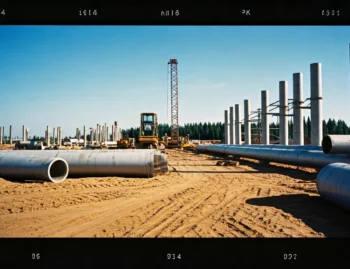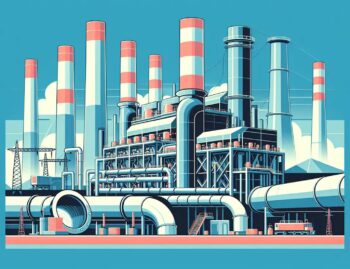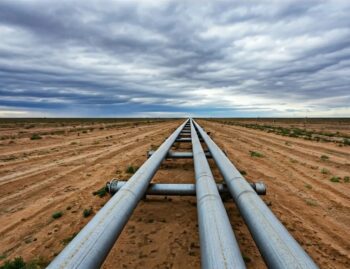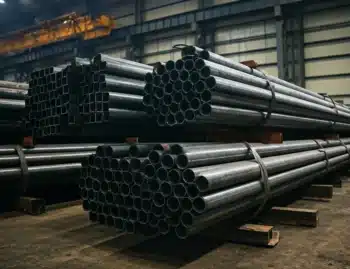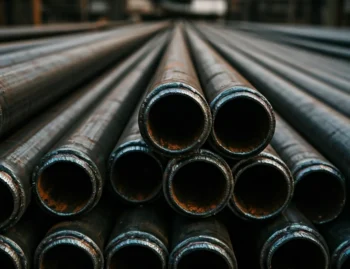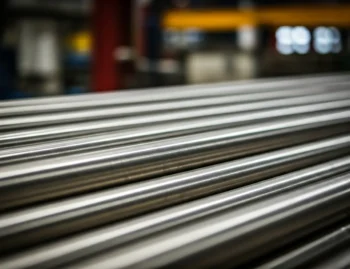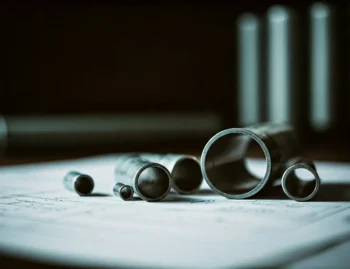
Steel pipes are a versatile and essential component in many industries. With a variety of types available, each serves unique purposes and offers specific benefits. In this blog, we’ll explore different types of steel pipes and understand how they cater to various needs.
1. Seamless Pipes for Robust Reliability
Seamless pipes are crafted without any welds, providing superior strength and durability. They are ideal for high-pressure applications and ensure a leak-proof performance. The absence of seams eliminates the risk of weak points, making them particularly valuable in the oil and gas industries where safety is paramount. Their uniform structure also enhances their ability to withstand extreme temperatures and stress.
Due to their high reliability, seamless pipes are extensively used in petroleum industry applications, such as casing and tubing. This makes them indispensable in exploration and drilling operations. Additionally, manufacturing processes for seamless pipes involve techniques like rotary piercing, which result in highly precise dimensions, further enhancing their suitability for critical systems.
2. Welded Pipes: Cost-Effective and Versatile
Welded pipes are made by rolling and welding steel sheets. These pipes are more economical and can be customized in terms of size and thickness, making them suitable for a wide array of uses including water transportation and architectural applications. Their flexibility in design and ease of production offer significant cost savings, especially for large-scale projects.
For industries with moderate pressure requirements, such as the construction and plumbing sectors, welded pipes are a preferred choice. Innovations in welding technology have increased their competitiveness against seamless pipes by enhancing weld quality and the structural integrity of the pipe. This evolution has widely expanded their applicability in many non-oil applications.
3. Galvanized Pipes for Corrosion Resistance
Galvanized pipes feature a protective zinc coating that offers excellent corrosion resistance. These are commonly used in outdoor and harsh environments. Their ability to resist rust and corrosion makes them durable options for water distribution and structural supports where exposure to moisture is frequent.
By employing galvanization, these pipes gain longevity and reliability in external plumbing applications. This coating method also provides a cost-effective layer of protection compared to stainless steel, offering economic advantages while maintaining necessary performance standards in residential water systems.
Furthermore, galvanized pipes in agriculture provide durability for irrigation systems. The thick zinc coating offers protection against the elements, which is critical in environments where operational lifespans are extended by continuous exposure to water and other external factors.
4. Black Steel Pipes for Gas and Water Lines
Black steel pipes have a black oxide scale on the surface, making them durable for transporting water and gas but not suitable for carrying drinking water due to potential rust. This lack of coating not only keeps costs lower but also allows these pipes to handle high pressures, making them ideal for distributing natural gas and heating systems.
In industrial applications, black steel pipes provide robust solutions for firefighting systems. These systems require resilience against high-pressure water flow and potential temperature fluctuations, roles that black pipes perform exceptionally well due to their simple yet strong design.
5. Stainless Steel Pipes for a Sleek Aesthetic
Known for their polished appearance and high resistance to rust, stainless steel pipes are widely used in applications requiring both functionality and aesthetic appeal. Kitchens and bathrooms implement these pipes for their clean finish and durability, adding value to both residential and commercial properties.
Stainless steel’s alluring finish is paired with low maintenance needs, making it a premium choice for architectural elements. The material’s natural resistance to corrosion surpasses that of most other metals, ensuring that installations remain pristine with very minimal upkeep.
6. Alloy Steel Pipes for Enhanced Strength
Integrating various alloying elements, these pipes provide superior strength and are suitable for high-temperature and high-pressure jobs in industries like power generation. Thanks to the inclusion of elements such as nickel and chromium, they offer improved mechanical properties compared to carbon steel pipes.
The versatility of alloy steel pipes extends to the automotive industry. Here, they are crucial in components like axles and drive shafts, where performance under stress and wear resistance are paramount. This adaptability ensures they are leveraged in many applications demanding rigorous material performance.
7. Carbon Steel Pipes for Versatile Use
Combining carbon with steel, these pipes are highly versatile, used in industrial and residential settings due to their strength and cost-effectiveness. The balance of strength and affordability makes carbon steel pipes prevalent across numerous sectors where budgets and material demands intersect.
Carbon steel stands out for its ease of processing and ability to be molded into various shapes and sizes, complemented by excellent durability. This adaptability makes it particularly valuable in construction frameworks, where precise specifications are often needed alongside reliability.
8. Duplex Stainless Steel for High Corrosion Resistance
These pipes offer double the strength of standard stainless steel and are highly resistant to corrosion, making them ideal for seawater applications. The dual-phase structure of duplex stainless steel combines excellent mechanical properties with increased corrosion resistance.
In marine applications such as offshore oil rigs and shipbuilding, they’re essential for withstanding prolonged exposure to salty marine environments. Their robustness ensures long-lasting performance in environments where maintenance opportunities may be limited.
9. Copper Steel Pipes for Specialized Applications
These pipes incorporate copper to enhance heat conductivity and resistance to biofouling, making them suitable for heat exchangers and maritime usages. The copper element not only aids in thermal efficiency but also contributes to the pipe’s longevity by inhibiting microbial growth that can occur in aquatic systems.
In applications where heat transfer is crucial, such as HVAC systems, copper steel pipes offer significant energy efficiency improvements. The material’s inherent properties reduce operational costs by enhancing system performance and reducing wear from temperature extremes.
10. Pre-insulated Pipes for Temperature Control
Pre-insulated pipes help maintain temperature over long distances, making them perfect for district heating systems and transporting thermal fluids. The insulation layer significantly reduces thermal loss, ensuring energy efficient delivery of heating or cooling solutions.
These pipes are also crucial in maintaining the temperature of fluids over extended networks, such as those used in geothermal installations. By maintaining thermal stability, pre-insulated pipes enhance system efficiency and reliability, particularly in areas demanding regulated environmental control.
11. Precision Steel Pipes for Automotive Excellence
Precision pipes offer tight tolerances and are used extensively in the automotive industry for components requiring high precision and quality. Their consistent dimensions and enhanced surface quality make them ideal for high-performance systems in modern vehicles.
These characteristics are invaluable for the production of brake rods and fuel delivery systems, where precision cannot be compromised. Precision pipe manufacturing often incorporates advanced techniques like cold drawing processes, which produce high-grade steel suitable for complex automotive components.
12. Structural Steel Pipes for Construction
These pipes provide excellent support in construction owing to their strength and reliability, often used in building frames and columns. Their inherent capability to handle substantial loads makes them indispensable in infrastructure projects and architectural designs.
Steel’s unparalleled strength-to-weight ratio lets structural steel pipes support extensive weights without adding significant mass. This results in safer and more stable structures, enhancing the durability and lifecycle of buildings, bridges, and industrial supports.


